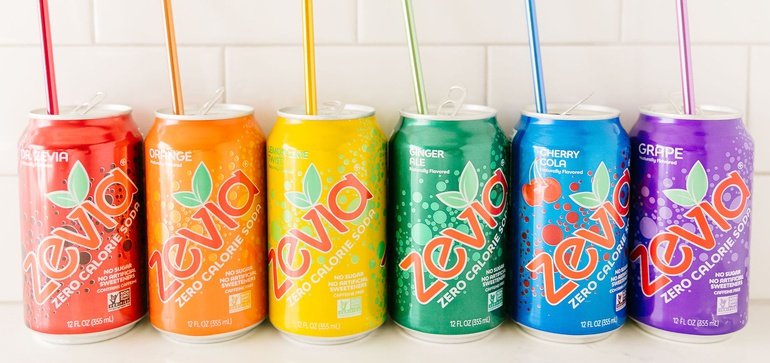Fresh off its IPO, stevia-sweetened soda maker Zevia aims for beverage dominance

Paddy Spence was walking through Whole Foods in 2009 when he discovered a stevia-sweetened cola he loved so much that he decided to purchase the company and invest $3 million of his own money in it.
Now, 12 years later the CEO of that brand, Zevia, has taken his fast-growing company public as the beverage maker taps into consumer demand for no-calorie, no-sugar offerings while aiming to fend off competition from juggernauts like Coca-Cola and PepsiCo.
“When we bought the business, this was a $5 million brand, highly unstable and with the somewhat insane proposition of competing head on with multi-billion dollar category leaders,” Spence said July 22, the day of the company’s IPO. “It was a huge gamble, but it paid off and that is what I think makes [this IPO] so exciting and so sweet.”
Zevia, which was founded in 2007, has experienced skyrocketing sales growth as consumers shun sugary sodas in favor of beverages that don’t have the same negative health impacts. Its beverages were offered in more than 22,000 stores last year, an increase of 4,000 locations from 2018, according to the company’s S-1. Net sales soared to $110 million in 2020 from $6.8 million a decade earlier — a 32% compound annual growth rate.
Despite the growth, Zevia has posted losses until its first quarter of 2021 with most of its money directed toward innovation and expanding the business. Its first week as a public company has been a struggle, with its stock generally trading below its $14 IPO price. Zevia’s stock was up 34 cents to $13.50 in early morning trading on Wednesday.

Paddy Spence, Zevia CEO
Permission granted by Zevia
In addition to its no-sugar, no-calorie drinks, Zevia finds itself immersed in many of the trends important to consumers today that Spence said could help attract users to his brand. The drink maker uses non-GMO ingredients, is a Certified B Corporation and embraces sustainability by packaging all of its drinks in aluminum cans versus plastics. Zevia also recently switched from traditional to organic stevia.
Spence was decidedly upbeat about the company’s prospects globally as consumers eat healthier. He made the decision to switch to stevia two decades ago after noticing he was consuming 1,000 calories from sugar hidden in products he thought were healthy, and he’s banking on more consumers adopting a similar mindset.
Despite the sharp drop in soda consumption during the last two decades, Spence estimated the average American still drinks 40 gallons of the beverage each year. At the same time, more than 50 countries around the world have put in place sugary beverage taxes that could help spur more consumers to drink products without the sweetener.

Optional Caption
Permission granted by Zevia
Zevia’s roots go back 14 years ago when it started out as a small soda company with three flavors. Since then, the California-based beverage company has expanded its portfolio to include energy drinks, tea, mixers, sparkling waters and children’s beverages. Cola is now responsible for roughly a quarter of its sales.
“We actually have an offering for every member of the household, every time of day from the moment you wake up until the time you go to sleep, so it’s a great platform,” Spence said. “And this is a fantastic opportunity to continue to drive growth with this IPO.”
Still, he said Zevia has a “tremendous amount” of beverage categories it could enter with a bold ambition to have a presence in everything except alcohol, protein and nondairy. He highlighted coffee and sports drinks as potential categories it could enter next. Food also is a long-term possibility.
Instead of sugar, Zevia sweetens its beverage with stevia, a calorie-free, natural sweetener derived from the plant of the same name. Stevia has been tried in Vitamin Water, Pepsi and Coca-Cola, as well as other smaller drink brands, but all have dropped it because of consumer complaints. Many types of the extract naturally have a somewhat bitter aftertaste.
Zevia has stood by stevia and made frequent changes to how it uses the sweetener, including tweaking recipes and introducing beverages with flavors that better harmonize with its taste.
“The category leaders have a very different philosophy. Their philosophy is have an incredible secret formula, lock it in the vault for 100 years, and hope the world doesn’t change,” Spence said. “The world’s changing really fast and so I think our iterative approach is absolutely a winning formula going forward.”
Zevia finds itself in the ultra-competitive beverage space, going up against deep-pocketed and more established competitors, including energy drink Monster Beverage, LaCroix sparkling water maker National Beverage, Coca-Cola and PepsiCo. Early signs are promising, with Zevia noting in its S-1 that its brand is growing at a faster pace than other zero calorie sodas.
“For 100 years, they’ve sought to win on taste but often at the expense of clean ingredients. We, on the other hand, believe the whole consumer landscape is changing and today brands in beverage not only need to win on taste but they also need to win with clean ingredients,” Spence said. “That is where we win every single time.”
Source: fooddive.com

